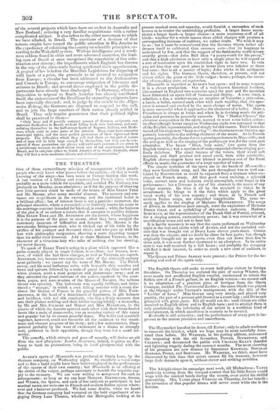AUBER'S opera of Masaniello was produced at Drury Lane, by
the German company, on Wednesday night. So excellent a vocal corps and so fine a band might have been better employed in the performance of the operas of their own country ; but Masaniello is an offering at the shrine of the vulgar, perhaps necessary to furnish the requisite sup- ply to the treasury. We are very willing to Compound for such an arrangement : so long as we can hear MOZART, BEETHOVEN, SPOHR, and WEBER, the Queen, and such of her subjects as participate in her musical tastes, are welcome to French and modern Italian operas where- ever and whenever produced. We had some doubts, when we heard that the German company had ventured on the bold experiment of en- gaging Drury Lane Theatre, whether the Metropolis, looking at its present musical state and capacity, would furnish a succession of such houses as to render the undertaking profitable. A larger house neces- sitates a larger band—a larger chorus—a more numerous staff of all kinds : whether for a whole season these added charges will produce a corresponding increase of auditors, we rather doubt. We wish it may
be so : but it must be remembered that the German Opera rather ad- dresses itself to cultivated than common ears—that its language is understood by few, and that the support of the fashionable world is very scantily given—that John Bull likes "a pennyworth for his penny," and that a high admission to hear only a single piece he will regard as a sort of innovation upon his established right to have two. In vain you tell him that one good piece is better than two inferior or three bad ones : that is all a matter of logic ; John sticks to his arithmetic
and his rights. The German Opera, therefore, at present, will not attract either the great or the little vulgar : hence, perhaps, the neces- sity of something more ad captandum. Masaniello is regarded as AUBER'S best opera : and in some respects it is a clever production. Out of a well-known historical incident,
(dramatized in England two centuries ago,) the poet and the musician have fabricated an opera full of business and display. A consl.iraCy, a rebellion, a fire, a market-scene, an eruption of Vesuvius, a procession, a battle, a ballet, succeed each other with such rapidity, that the spec- tator is amused and excited by the mere change of scene. The opera. is most successful when it approaches the character of a ballet. Here a Frenchman is always at home, and when he is devising music for atti-
tudes and postures he generally succeeds. The "Market Chorus." the cleverest composition in the opera, seemed to want some ballet action :
its effect (thongh better sung) on Wednesday night was not equal to that
of the English representation, and simply for this reason. TOM COME di,- rected all his singers to "keep moving "—the Germans were fixtures, ap-
parently insensible to the stirring character of the music. As in French
operas generally, the chorus forms a prominent feature in Masonic& ; and the acting as well as the singing of the performers was_for the most part
admirable. The hymn "Hear, holy saint," (we quote from the English version,) was a specimen of unaccompanied chorus-singing per- fectly delicious. The exact balance of the voices, their sweet soft
murmur, and their gradual and equal swell, were alike admirable. English chorus-singers have not learned to produce one of the finest effects in music, the pianissimo of a large number of voices. The simple melodies of the opera are in the hands of Masaniello they were beautifully sung, and the part throughout was as well sus- tained by HAITZINGER as could be expected from a German when em-
ployed on French music. All that good vocal training, a splendid voice, correct taste and industry could accomplish, were found in his performance ; but a German is out of his element in the music of any foreign country. He tries it all by the standard to which he is accustomed : he brings to it the rules which apply to the great vocal works of his own country ; and those, as to French and modern Italian songs, are altogether inapplicable. The same re-
mark applies to the singing of Madame HEINEFEIMER. The songs of Elvira, in themselves poor enough, want the explosions of Madame Dortus GRAS, and a sprinkling of sky-rocket cadences. Madame SCHUMANN, as the representative of the Dumb Girl of Partici, evinced, for a singing actress, extraordinary power ; but it was somewhat of a mortification to see and not to hear her.
It is hardly necessary to say that the opera performed on Wednesday night is the real and entire work of AUBER, and not the curtailed ver-
sion that was brought out at Drury Lane eleven years since. Coosa was then the adapter, and no doubt he chose its best parts ; but, though originally brought out as an opera, even then cut down from five to three acts, it was soon further shortened to an afterpieee. In its entire state it was well received by a full house ; and probably the company will find it their interest, in order to catch a new class of auditors, to repeat it.
The Queen and Prince ALBERT were present ; the Prince for the be- ginning and end of the opera only.


























 Previous page
Previous page